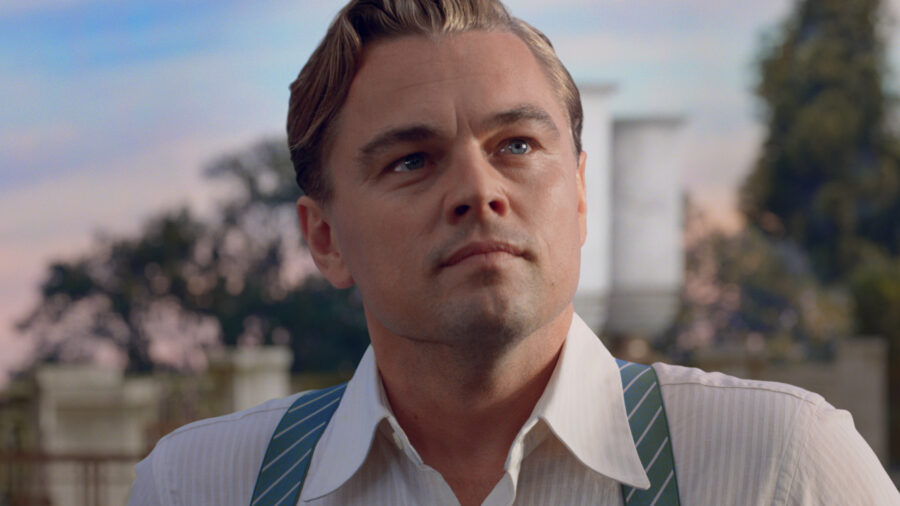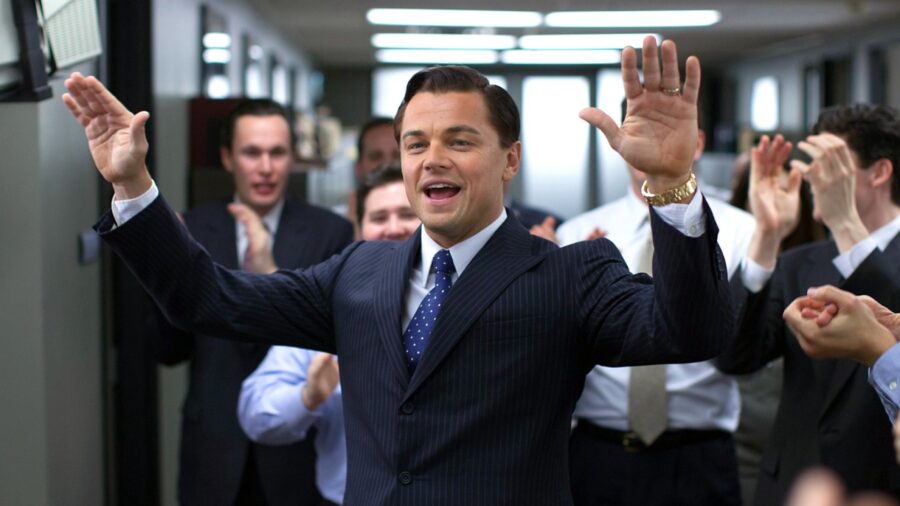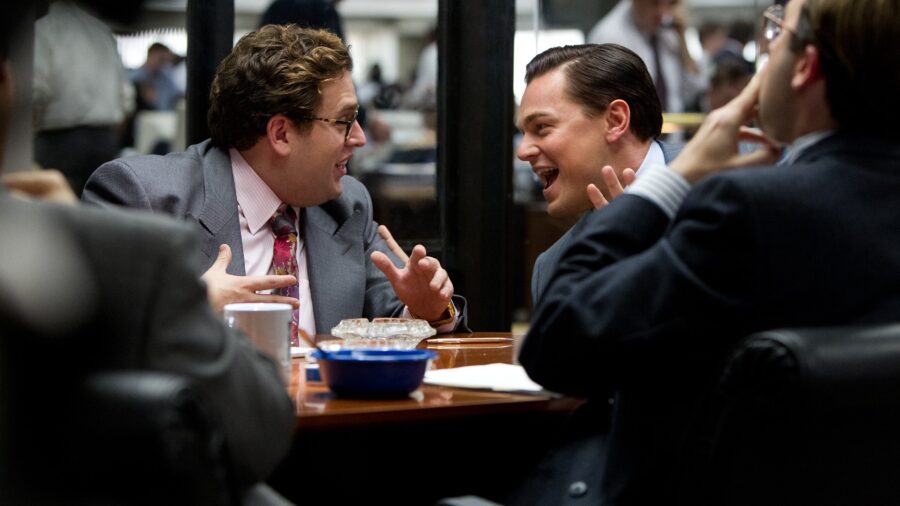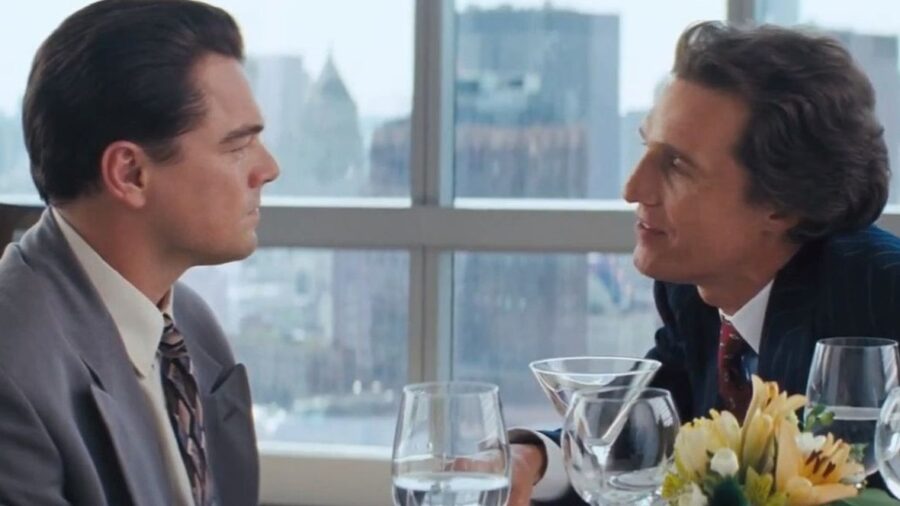Leonardo DiCaprio’s Controversial Biopic Is Crushing It On Streaming
Leonardo DiCaprio has never been more persuasive than in this controversial comedy now crushing it on streaming.
This article is more than 2 years old

After the overwhelming, historic success of James Cameron’s Titanic, Leonardo DiCaprio has largely done everything he can to make himself unappealing. An armchair psychologist might speculate that all the attention paid to his Tiger Beat boyish good looks and charm made him turn a 180 and try to obscure angelic features in a bid for critical respectability. Though he never shunned roles that highlighted his looks entirely, Leonardo DiCaprio’s movies increasingly had him donning ratlike facial hair (Shutter Island, The Gangs of New York, The Revenant) or portraying a monster (J. Edgar, Django Unchained) or both. But one of his rare movies in which he utilized his movie star charisma and his ability to behave abominably at the same is crushing it online. 2013’s white-collar dark comedy The Wolf of Wall Street and Leonardo DiCaprio’s performance as a master of drug-fueled sleaze is currently in the top ten most-watched movies on Amazon Prime.

The Wolf of Wall Street stars Leonardo DiCaprio as Jordan Belfort, a real-life ex-convict, former stockbroker, and snitch. The movie is based on his dubiously factual memoir of the same title, which he was encouraged to write by his cellmate, actor and comedian Tommy Chong, while serving a sentence at Taft Correctional Institution after being indicted by the FBI for money laundering and securities fraud. It is good to get that information up front, because both Wolf of Wall Street director Martin Scorsese and Leonardo DiCaprio walk a very thin line between glorifying the lifestyle and crimes of Belfort and his cohorts and condemning them.

To be sure, both Leonardo DiCaprio and Martin Scorsese have been unequivocally clear that they do not feel the movie supports or condones the massive, enormously damaging impact that Belfort’s actions had on the lives of people who trusted him with their financial affairs. But you cannot have one of the most charismatic and beautiful people in the world display massive wealth, a life of seeming unfettered sexual excess, constant recreational drug use, and adulation and not expect that some audiences will think that is pretty cool.

But to get into the actual movie, The Wolf of Wall Street largely consists of Leonardo DiCaprio breaking the fourth wall and directly addressing the audience, describing how he got to be the titular so-called wolf of Wall Street and how the financial crimes he engaged in actually worked. It follows him from his early days as a junior stockbroker under Matthew McConaughey’s mentorship until he was derailed by 1987’s Black Friday, his recovery selling dubiously legal securities, his recruitment of a pack of nebbishy creatures of the human id (played with various degrees of sleaze by P. J. Byrne, Kenneth Choi, Brian Sacca, Henry Zebrowski, Ethan Suplee, and most odiously, Jonah Hill), his tumultuous marriage to Naomi Lapaglia (Margot Robbie in her breakout role), his international money-laundering schemes, and eventual downfall at the hands of the FBI (represented by that paragon of American decency, Kyle Chandler) via a connection to the teppanyaki chain restaurant Benihana.

It is an exhilarating ride, particularly as told by Leonardo DiCaprio and Martin Scorsese. The Wolf of Wall Street is, in many ways, a thematic sequel to Scorsese’s masterpiece Goodfellas, in which a golden boy finds his life spiraling out of control due to crime, drugs, and hubris while narrating it all for the audience. The real difference is only the nature of the crime: while mob activities like hijacking trucks and murder can be assumed to be wrong, Leonardo DiCaprio is very, very persuasive that everything you see on screen is just part of the system and something you would do too if you got the chance.

And that is the real key to The Wolf of Wall Street, and what many people outraged by the rampant on-screen drug use, debauched sex, violence, record-breaking profanity, and consistent presence of Jonah Hill missed. The Wolf of Wall Street is a sales pitch to the audience themselves from Leonardo DiCaprio who acknowledges up front that he is a salesman (a classic sales technique) and then tries his best to get you on his side, no matter what they see. The movie frequently tips its hand by depicting the opposite of what Leonard DiCaprio is claiming, by subtly changing details as it goes (like the color of a car), or simply showing the protagonists of the film to be moronic, childish, barely competent crooks.
Naturally, many of the people portrayed in The Wolf of Wall Street did not care for how the movie displayed them, and there are a whole lot of pseudonyms and composite characters here. Nevertheless, the movie swiftly became a huge blockbuster for Leonardo DiCaprio, the highest-grossing movie of Martin Scorsese’s career, and a critical darling nominated for five Academy Awards. But after all, Leonardo DiCaprio is a very, very persuasive man.












